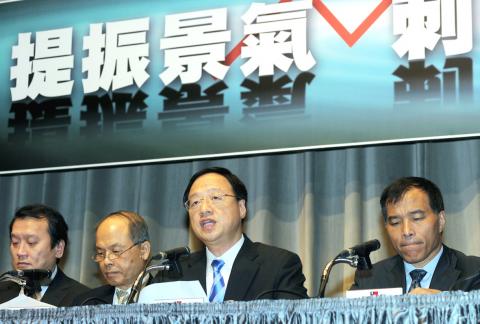The Executive Yuan yesterday unveiled a package of 13 measures to boost what Premier Jiang Yi-huah (江宜樺) has described as the nation’s “suffocated” economy to ensure that GDP growth reaches the government’s 3 percent growth target this year.
At a press conference to announce the package, Jiang said that the measures would “contribute positively toward GDP” by seeking to expand consumption, attract investment, encourage new businesses and revise the capital gains tax on securities investments.
Jiang would not specify how many percentage points the measures were aiming to add to GDP growth, saying it is difficult to make such predictions.

Photo: CNA
“Analysts have been forecasting a turnaround in the second half of this year and we will continue to take steps to strengthen the economy and attain 3 percent GDP growth,” Jiang said.
One of the measures involved the legislature passing an amendment to the Income Tax Act (所得稅法) before the current session ends on Friday to drop the 8,500-point threshold that automatically triggers the capital gains tax for individual investors, Jiang said.
The Chinese Nationalist Party (KMT) has proposed removing the requirement that the TAIEX surpass 8,500 points for the tax to be imposed and replace it with a tax on investors who sell NT$1 billion (US$33.3 million) worth of shares during one calendar year.
The premier said that abolishing the threshold would turn the economy around because it would be like “lifting the cover off a pot” to let the “suffocated” economy breathe.
Jiang said he has already spoken with Legislative Speaker Wang Jin-pyng (王金平) to say he hoped the legislature could push through the tax amendment by Friday instead of waiting for the planned extra session next month.
The tax, which was introduced in July last year, is generally perceived as “a major culprit behind the sluggishness of the economy in the first half of the year,” Jiang said.
However, Wang was pessimistic about the timeline.
Since opposition parties have expressed dissenting views about the KMT’s proposal, the amendment would be placed on the agenda for the extra legislative session, Wang said.
An extra session has been scheduled to run from June 13 to June 27 and the KMT has said it would push for a second extra session in late July if necessary.
KMT Legislator Lai Shyh-bao (賴士葆) said the tax amendment would be the most effective of the 13 measures boosting the economy and called on Jiang to discuss the issue with opposition leaders “instead of just making appeals via the media.”
The Directorate-General of Budget, Accounting and Statistics last week lowered its economic growth forecast for this year from its 3.59 percent projection made on Feb. 22 to 2.4 percent.
The Executive Yuan is to invest NT$3.24 billion to implement the 13 measures, some of which are to last for five years.

ENDEAVOR MANTA: The ship is programmed to automatically return to its designated home port and would self-destruct if seized by another party The Endeavor Manta, Taiwan’s first military-specification uncrewed surface vehicle (USV) tailor-made to operate in the Taiwan Strait in a bid to bolster the nation’s asymmetric combat capabilities made its first appearance at Kaohsiung’s Singda Harbor yesterday. Taking inspiration from Ukraine’s navy, which is using USVs to force Russia’s Black Sea fleet to take shelter within its own ports, CSBC Taiwan (台灣國際造船) established a research and development unit on USVs last year, CSBC chairman Huang Cheng-hung (黃正弘) said. With the exception of the satellite guidance system and the outboard motors — which were purchased from foreign companies that were not affiliated with Chinese-funded

PERMIT REVOKED: The influencer at a news conference said the National Immigration Agency was infringing on human rights and persecuting Chinese spouses Chinese influencer “Yaya in Taiwan” (亞亞在台灣) yesterday evening voluntarily left Taiwan, despite saying yesterday morning that she had “no intention” of leaving after her residence permit was revoked over her comments on Taiwan being “unified” with China by military force. The Ministry of the Interior yesterday had said that it could forcibly deport the influencer at midnight, but was considering taking a more flexible approach and beginning procedures this morning. The influencer, whose given name is Liu Zhenya (劉振亞), departed on a 8:45pm flight from Taipei International Airport (Songshan airport) to Fuzhou, China. Liu held a news conference at the airport at 7pm,

Taiwan was ranked the fourth-safest country in the world with a score of 82.9, trailing only Andorra, the United Arab Emirates and Qatar in Numbeo’s Safety Index by Country report. Taiwan’s score improved by 0.1 points compared with last year’s mid-year report, which had Taiwan fourth with a score of 82.8. However, both scores were lower than in last year’s first review, when Taiwan scored 83.3, and are a long way from when Taiwan was named the second-safest country in the world in 2021, scoring 84.8. Taiwan ranked higher than Singapore in ninth with a score of 77.4 and Japan in 10th with

GRIDLOCK: The National Fire Agency’s Special Search and Rescue team is on standby to travel to the countries to help out with the rescue effort A powerful earthquake rocked Myanmar and neighboring Thailand yesterday, killing at least three people in Bangkok and burying dozens when a high-rise building under construction collapsed. Footage shared on social media from Myanmar’s second-largest city showed widespread destruction, raising fears that many were trapped under the rubble or killed. The magnitude 7.7 earthquake, with an epicenter near Mandalay in Myanmar, struck at midday and was followed by a strong magnitude 6.4 aftershock. The extent of death, injury and destruction — especially in Myanmar, which is embroiled in a civil war and where information is tightly controlled at the best of times —